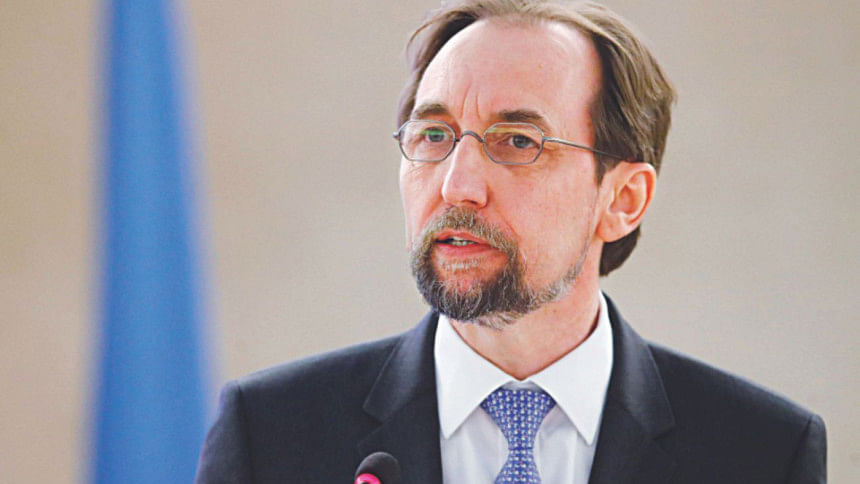Myanmar's Rakhine State: UN rights chief suspects 'acts of genocide'

The UN human rights chief yesterday said he strongly suspected that “acts of genocide” might have taken place against Rohingyas in Rakhine since August last year.
Reports of bulldosing of alleged mass graves showed a “deliberate attempt by the authorities to destroy evidence of potential international crimes, including possible crimes against humanity,” Zeid Ra'ad al-Hussein told the UN Human Rights Council, reports Reuters from Geneva.
Nearly 700,000 Rohingyas have fled Rakhine into Bangladesh since insurgent attacks sparked a security crackdown in August, joining some 300,000 refugees from a previous exodus from Myanmar, which denies citizenship and other basic rights including healthcare, freedom of movement.
Doctors without Borders said at least 6,700 Rohingyas were killed in the first month since August 25. Human Rights Watch and Amnesty International found evidence of burning hundreds of villages, while women were subjected to sexual abuse and rape.
The UN earlier described the army's actions as ethnic cleansing and having the hallmarks of genocide. Amnesty has accused Myanmar of crimes against humanity.
Zeid said he believed ethnic cleansing was still underway in Rakhine. Rohingyas were still fleeing because of “systematic” if lower-intensity persecution and violence there, he added.
“Victims have reported killings, rape, torture and abductions by the security forces and local militia, as well as apparently deliberate attempts to force the Rohingya to leave the area through starvation, with officials blocking their access to crops and food supplies,” the UNHRC chief told the Geneva forum.
There was no immediate comment by the Myanmar government. In the Council, its delegation is allowed to respond today [Thursday].
According to Zeid, his office received reports of land inhabited by Rohingyas being appropriated and members of other ethnic groups replacing them.
“A recent announcement that seven soldiers and three police officers will be brought to justice for the alleged extra-judicial killing of 10 Rohingya men is grossly insufficient,” he added.
Zeid said the Myanmar government must take steps to provide real accountability for violations and respect the Rohingyas' rights, including citizenship.
A fact-finding mission set up by the UNHRC, headed by former Indonesian attorney general Marzuki Darusman, is due to report on its initial findings on Monday after interviewing victims and survivors in Bangladesh and other countries.
Pending their final report, the UN General Assembly should establish a new independent mechanism to expedite criminal proceedings in courts against those responsible, Zeid observed.
MILITARY DENIES VIOLENCE
Myanmar military has denied any violence, extrajudicial killings, rape and arson committed in Rakhine, and put the blame on the Arakan Rohingya Salvation Army (Arsa) for “genocide and ethnic cleansing” in Rakhine's Buthidaung-Maungtaw, The Guardian reported yesterday.
A total of 102 British MPs signed a letter asking the UK Foreign Secretary Boris Johnson and the EU to impose sanction on Myanmar over the campaign of violence committed against its minority Muslim community.
In a statement responding to the letter, the Myanmar army on Tuesday accused the UK lawmakers of making “one sided-accusations” about the plight of the Rohingyas.
According to “hard evidence” the military allegedly collected, it claims that between 10,000 and 20,000 Rohingyas took part in attacks on police in August last year -- a vastly different figure from the military's estimate of 1,000 Rohingya insurgents at the time.
The army also claimed to have carried out an investigation into the violence in Rakhine, which concluded that “security personnel did not commit extrajudicial killings or sexually abuse and rape women. There was no unlawful detention of people, beating, killing and arson as well.”
In the case of Rohingya villages that had been burned down, “Arsa extremist Bengali terrorists set fire to houses and fled to Bangladesh first. They also threatened, coerced and persuaded other villagers to flee to Bangladesh, and many fled as a result,” the military's own investigation found.
However, the army later admitted that its soldiers were involved in the murder of 10 Rohingyas, the human remains of whom were found in December in a mass grave outside Inn Din, a village in the Maungdaw township.
The military's denial directly contradicts mountains of evidence collected by organisations such as Amnesty and Human Rights Watch (HRW) as well as multiple reports in the media, with two Reuters journalists on trial in Myanmar for their investigations into mass graves.
Phil Robertson, deputy Asia director of HRW, said, “It's not often that you see a bald-faced lie of this magnitude, but then again, the Tatmadaw [armed forces] have a lot of experience in having no shame -- since they've been covering up their human rights atrocities for decades.
“Statements like these indicate why the international community must prioritise hauling Senior General Min Aung Hlaing and other Burmese military commanders up in the international criminal court to stand trial for the crimes against humanity they've ordered or committed,” he told The Guardian.

 For all latest news, follow The Daily Star's Google News channel.
For all latest news, follow The Daily Star's Google News channel. 



Comments